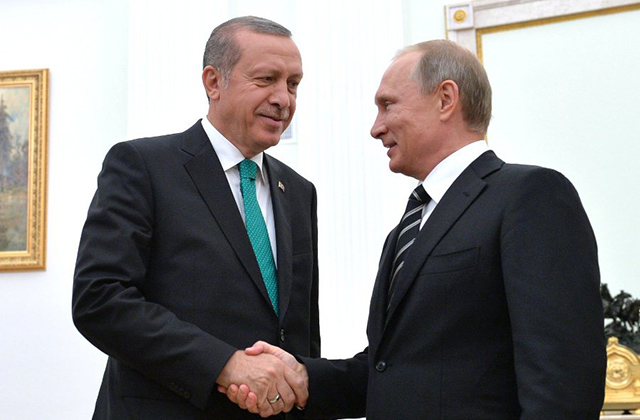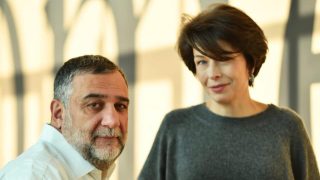Turkey’s Erdogan Patches Up Relations With Putin: WSJ

Russian President Vladimir Putin and his Turkish counterpart Recep Tayyip Erdogan mended fences in a high-profile meeting Tuesday, bolstering their governments’ ties as both face strained relations with the West, the Wall Street Journal reports.
The meeting, Mr. Erdogan’s first trip abroad since the Turkish coup attempt last month, signals his willingness to look to Moscow, traditionally the counterweight to Western influence in the Middle East. But Western leaders say Turkey, which is crucial to operations against Islamic State and has the North Atlantic Treaty Organization’s second-largest army, will remain a firm ally of the West.
The two leaders promised to boost trade, energy and tourism ties on Tuesday. It was their first meeting since relations between their governments ruptured last year after Turkish F-16s shot down a Russian Su-24 warplane near the Syrian border.
Mr. Putin held out the possibility of restoring business ties to levels seen before the breakdown, but said change would come gradually. Turkey has been hard hit by the business sanctions, which have taken aim at the country’s crucial tourism, construction and food export sectors.
“We will gradually be lifting the measures implemented in regards to Turkish companies, the sanctions,” said Mr. Putin, following a one-on-one meeting and talks between Russian and visiting Turkish delegations.
“Regarding the full restoration of ties with Turkey, do we want it?” he said. “Yes, and we will carry it out.”
Mr. Erdogan laid the groundwork for a rapprochement in late June, when he sent a letter to the Kremlin expressing his condolences to the family of the pilot killed in the downing of the plane. In a phone call that followed Mr. Putin’s receipt of the letter, the Kremlin leader promised to call off some measures that had limited Russian tourism in Turkey.
Turkey’s ties with Europe and the U.S. have been strained in the wake of the failed coup. Ankara has accused Western leaders of not showing enough solidarity in the wake of the failed coup as Mr. Erdogan’s government has cracked down on the alleged plotters. The Turkish president, though, emphasized several times that Mr. Putin phoned shortly after the takeover attempt to give a message of support and send condolences to those who died in the uprising.
In an interview with the official Rossiiskaya Gazeta newspaper ahead of the meeting, Mr. Erdogan declared the visit would open a “new page” in Russian-Turkish relations.
In Washington, the State Department played down the meeting and said it represented no threat to U.S. interests. Russia and Turkey are supporting the fight against Islamic State, and both are part of the international group trying to negotiate an end to fighting in Syria, a State Department spokeswoman said.
“We don’t view this as a zero-sum game,” said the spokeswoman, Elizabeth Trudeau. “Certainly, Turkey and Russia are both members of the fight against Daesh…There’s a lot of common goals, common interests there.”
Still, Kremlin watchers say Mr. Erdogan’s efforts to make amends with Moscow could spell some short-term uncertainties for NATO.
“Most of the big allies have increasing doubts about Russia, even if they want to reduce tensions,” said Tom Graham, managing director of Kissinger Associates, and former National Security Council adviser on Russia under the Bush administration. Though Turkey is a NATO ally, defending it takes on a “different context” if it becomes “an increasingly authoritarian state that, moreover, is cozying up to Russia.”
In Europe, the Erdogan-Putin rapprochement has been seen as an attempt by the Turkish leader to demonstrate that Russia can be an alternative to the European Union, which has been critical of his handling of the coup aftermath.
“In the long term, however, their interests don’t converge at all, especially on Syria, but also on economy and energy,” said one senior EU official. “That’s why it’s important we keep our channels to Ankara open.”
A second EU official described Mr. Erdogan’s visit to Moscow as a “demonstration of power that seems more than it is.” Officials said that three-quarters of the foreign direct investment in Turkey comes from EU countries.
EU-Turkey relations have soured over the past weeks, since Mr. Erdogan’s crackdown and call to introduce the death penalty, a move that would halt Turkey’s EU membership bid.
On Monday, Mr. Erdogan took to French newspaper Le Monde to denounce what he described as an “unacceptable” reaction by European leaders to the coup attempt, as opposed to Mr. Putin, who didn’t criticize him for cracking down on dissidents and coup plotters.
The Turkish leader also threatened to scrap a migration deal with the EU—which lets the EU return migrants who have crossed illegally to Europe from Turkish shores—if Turkish citizens aren’t granted visa-free travel to the European bloc. That prospect that is on hold as long as Turkey’s antiterror laws allow it to keep peaceful government critics behind bars on terrorism charges.
EU officials in Brussels doubt that the entire deal would be scrapped, as it involves €6 billion ($6.7 billion) in aid for the refugees in Turkey, but say that it is likely that some elements of the deal will be put on hold. With the countries north of Greece no longer allowing the transit of migrants, EU officials are confident that the crossing from Turkey to Greece will be less attractive than last year, when more than 1 million people arrived in Germany, mainly via Turkey and Greece.
Mr. Putin said that he and Mr. Erdogan agreed on the need to fight terrorism, but differences remain over regional security issues, not least the conflict in Syria, where the two leaders are backing opposing sides.
The two leaders spoke about the Syria conflict after a televised news conference but offered no commentary on the topic afterward.
Mr. Erdogan emphasized Turkey’s desire to realize a proposed Russian-backed natural gas pipeline called Turkish Stream. The pipeline is meant to deliver Russian gas to Turkey and potentially onward to Russia, helping Turkey realize its ambition of being a gas hub for Europe.
“We will take the necessary steps together with our relevant ministries and state agencies in order to assure deliveries of Russian gas to Europe,” Mr. Erdogan said.
Russian Energy Minister Alexander Novak said the two countries were in talks over preparing for the first line of the pipeline, which would solely serve Turkey. But he added that without a guarantee from Europe additional lines wouldn’t be built.
Valentina Pop in Brussels and Alan Cullison in Washington contributed to this article.

























